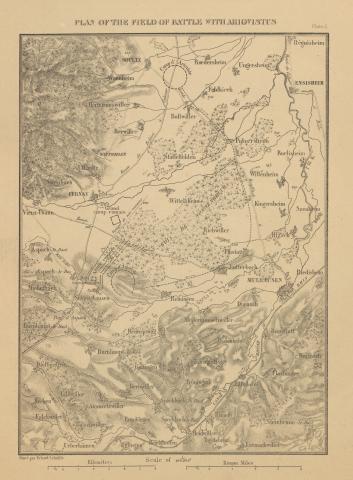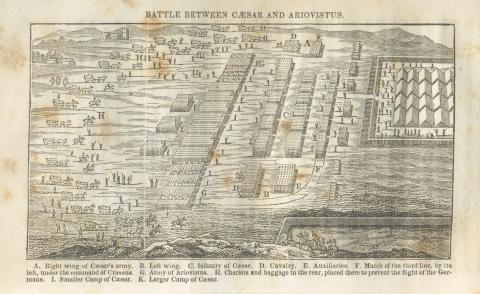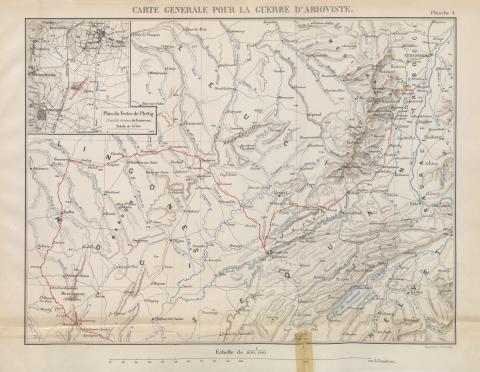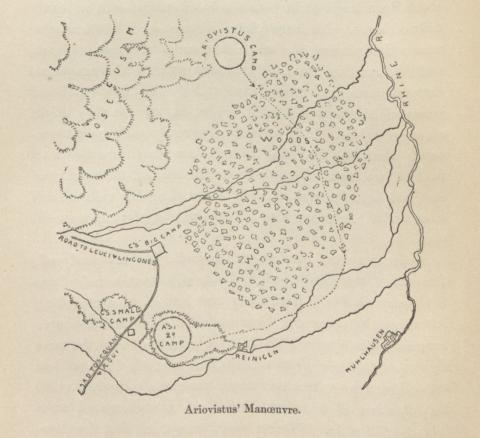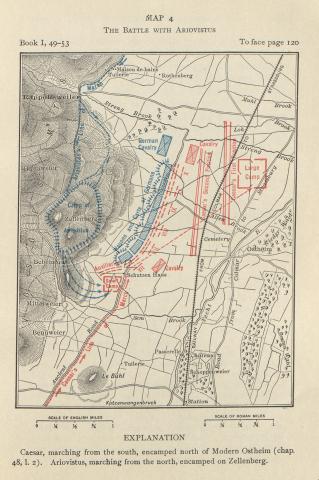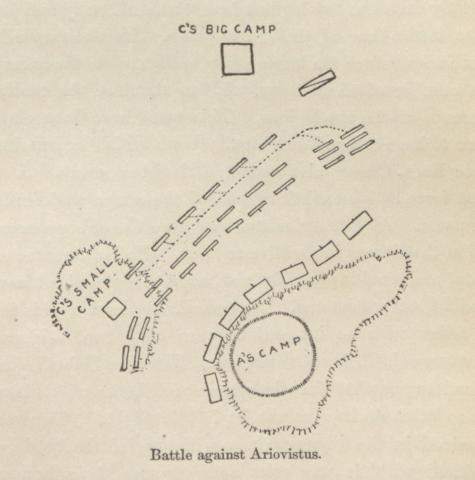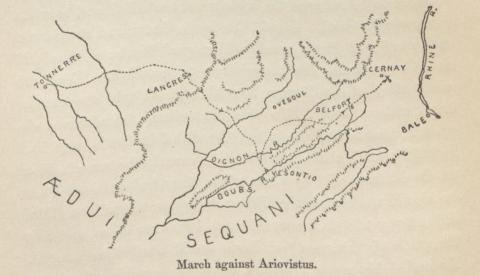restituō, -stituere, -stituī, -stitūtus : restore, renew, reinstate; begin again; give back, deliver up, return; rebuild.
priusquam : conj., earlier than, sooner than, before; also prius . . . quam.
dēsistō, -sistere, -stitī, -stitus : stand away, aesist, give up, leave off, cease.
priusquam : conj., earlier than, sooner than, before; also prius . . . quam.
Rhēnus, -ī, m.: the Rhine, a large river forming the boundary between Gaul and Germany.
passus, -ūs m.: step, pace; double step (five Roman feet); mīlle passūs, mile; duo mīlia passuum, two miles. See mīlle.
circiter : (1) adv., about, nearly; (2) prep. with acc., about, around, near.
quīnque (v); quīntus, -a, -um : indecl. adj., five; fifth
perpaucī, -ae, -a : pl. adj., very few.
cōnfīdō, -fīdere, -fīsus : have confidence in, rely upon, trust, believe; hope.
trānō, -āre, -āvī : swim over, swim across.
contendō, -tendere, -tendī, -tentus : strain, exert oneself; strive for, attempt, try; hasten, press forward; contend, vie; join battle, fight, quarrel; insist; demand.
linter, -tris, f.: boat, skiff.
Ariovistus, -ī, m.: Ariovistus, a German chief, or king.
nāvicula, -ae f.: small vessel, skiff, boat.
dēligō, -āre, -āvī, -ātus : tie down, make fast, fasten, moor.
nancīscor, nancīscī, nactus or nanctus: get, obtain, secure, meet with, find.
profugiō, -fugere, -fūgī : flee forth, escape.
equitātus, -ūs m.: cavalry, body of horsemen.
nostri -orum m. pl.: our men
Ariovistus, -ī, m.: Ariovistus, a German chief, or king.
Suēbus, -a, -um: Sueban, of the Suebi. The Suebi lived in Germany, but the exact locality is uncertain. Some think that several different German tribes were included under the name.
nātiō, -ōnis f.: race, tribe, people, nation.
Nōricus, -a, -um: pertaining to the Norici, Norican; as subst., f., a Norican woman; m. pl., the Norici, a tribe living near the Danube.
Vocciō, -ōnis, m.: Voccio, a king of the Norici.
Gāius -iī m.: Gaius (name), abbreviated "C."
Valerius, -ī, m.: Valerius, a Roman nomen: (1) Gaius Valerius Flaccus, governor of Gaul in 83 b.c.; (2) Gaius Valerius Caburus, a Gaul who received Roman citizenship from (1); (3) Gaius Valerius Procillus and (4) Gaius Valerius Domnotaurus, sons of (2); (5) Lucius Valerius Praeconinus, a legate who was killed in Aquitania a few years before 56 b.c.; (6) Gaius Valerius Troucillus, a prominent Gaul of the province, friendly to Caesar. See also Messāla.
Procillus, -ī, m.: Procillus, a Roman cognomen; see Valerius.
trīnī, -ae, -a : pl. adj., three at a time, three each; threefold; three.
catēna, -ae, f.: chain, fetter.
vinciō, vincīre, vinxī, vinctus : bind, fetter.
equitātus, -ūs m.: cavalry, body of horsemen.
persequor, -sequī, -secūtus : follow up, chase, hunt down; press upon, proceed against; resent, avenge.
quod : conj., that, in that, because, since; as to the fact that: the fact that.
familiāris, -e m.: intimate friend, associate
restituō, -stituere, -stituī, -stitūtus : restore, renew, reinstate; begin again; give back, deliver up, return; rebuild.
calamitās, -ātis, f.: loss, injury, disaster; overthrow, defeat.
grātulātiō, -ōnis f.: rejoicing, joy, congratulation.
dēminuō, -minuere, -minuī, -minūtus : make less, diminish, reduce; impair; take away.
praesum, -esse, -fuī : be before, be set over, be in command of.
ter : adv., three times.
necō, -āre, -āvī, -ātus : kill, slay, destroy.
reservō, -āre, -āvī, -ātus : keep back, reserve, keep.
incolumis, -e: uninjured, safe, unimpaired.
M.: the abbreviation for the praenomen Mārcus, Marcus, Mark.
Mettius, -ī, m.: Mettius, a Roman nomen; Marcus Mettius, a man whom Caesar sent as an envoy to Ariovistus.
redūcō, -dūcere, -dūxī, -ductus : lead back, bring back; draw off, withdraw; draw back, extend back.

